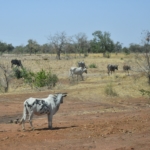


June 18, 2020
WAf Regional Team Meeting (April 17 & 20, 2020)
The West Africa regional team held Zoom teleconferences mid-April with the region’s project PIs and/or focal points to receive and share updates at both the personal and project levels and to hear about grantees’ adaptation to COVID-19. The meeting was split across two days to accommodate all 17 grantees and various focal points and to ensure everyone could take part.
The meeting started with the RT reminding attendees that the McKnight Foundation and the CCRP regard the pandemic as a significant threat. McKnight’s response included a three-month extension of projects, reiterating the foundation’s and regional team’s view that grantees’ and communities’ health is top priority. Aware of the negative effects of COVID-19 on field and research activities, the foundation hoped to collect valuable learning about how grantees are adapting to the new constraints.
All participants expressed excitement about connecting virtually and strengthening their sense of belonging to a community. They appreciated that the CCRP took the initiative to reach out and get and share updates, citing it as an example of the foundation’s mindful approach to and consideration of grantees and their communities. Many participants shared the stresses caused by the current situation but said they are coping. As of this writing, no project member or community in which they work has been directly affected by COVID-19. Some participants congratulated the RT for giving them the nudge to learn how to use Zoom for communication.
Each project conformed to the health and work measures prescribed by national and local authorities. Other than Mali, the common denominator among grantees was restriction of physical mobility due to the city lockdown and other anti-COVID-19 measures.
Three PIs working in France and the Netherlands are working virtually. Field activities are on hold for most projects per institutional and state anti-COVID-19 regulations, especially in Burkina Faso and Niger, where curfews and ongoing physical mobility restrictions exist because of lockdowns of major cities and areas with at least one confirmed case. Some PIs are working on fine-tuning their planning, preparing protocols, and doing data processing and cleaning as the situation unfolds.
Projects such as Cowpea Square have used funds from their travel monies to equip their students with phone internet credit to continue non-field activity virtually. The project also instituted virtual writing and data analysis coaching for master’s students. The projects AMSP, Sahel IPM, Farmers’ Knowledge, Women’s Fields, and AEI-Burkina are using WhatsApp discussions with local animators who will be supported with phone internet access. The others still basically rely on phone interaction.
Nearly all projects have given priority to virtual interaction via phone or WhatsApp. PIs working in academic institutions within the WAf region that closed schools face challenges ranging from delay in PhD student recruitment to field work by currently registered students. To adjust to the double challenge of security and the COVID-19 threat, the Bambara Nut project reduced its geographical scope of intervention to 50 kilometers from Ouagadougou.
Meeting participants agreed that virtual work should be prioritized to order to stay safe and not put the partners in danger.
The current COVID-19 threat has made the relevance of FRN timelier. Projects with strong farmer research networks tap into those networks to continue work with little disruption at field level. That is why they expressed need for more digital solutions (bundled phone communication, internet connection, smartphone, smart video projectors, etc.).
Moving forward: